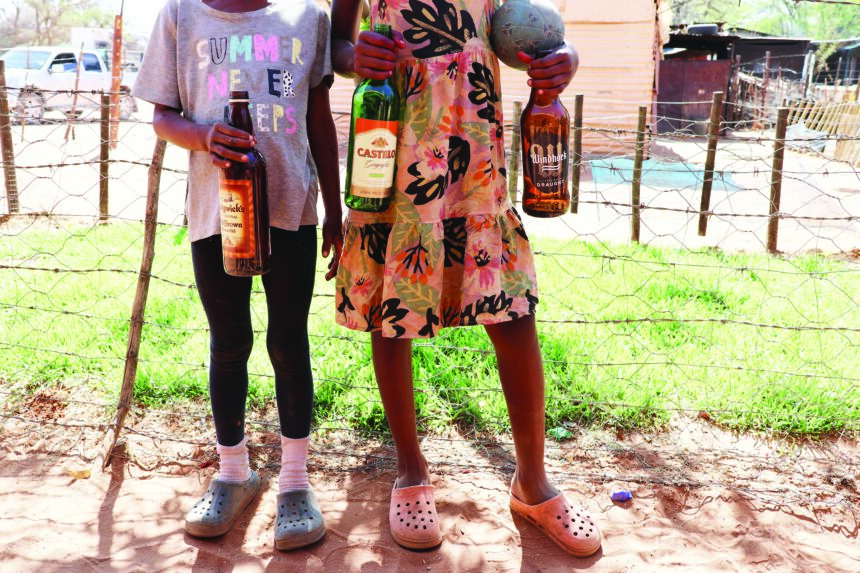Linea Dishena
DORDABIS – Yolanda Isaacks* (9), Jessica Jacobs* (8) and Steven Witbooi* (6) wander around the shebeens and bars of the Dordabis settlement, collecting empty liquor bottles in exchange for vetkoek, bread crumbs, and ice lollies to feed themselves.
The Grades 1, 2, and 3 pupils at Dordabis primary school, located 87 kilometres from Windhoek, are among the many children in the settlement, under the Windhoek Rural constituency, who collect empty bottles daily to feed themselves.
Speaking to Nampa on Tuesday while holding her two empty bottles, Isaacks said she collects bottles after school every day to feed herself, as most of the time, there is nothing to eat at home.
She explained that her mother does not work, making it difficult for them to have meals every day.
Each bottle is worth 50 cents, while a vetkoek costs N$1. The commodity exchange varies, with a packet of bread crumbs mixed with sugar costing N$1, a tamaletjie (homemade sweet) costing 50 cents, and ice lollies costing N$1.
Witbooi said on a daily basis, he mostly collects two bottles, which are equivalent to N$1, enough for a vetkoek.
Bar attendant Anna Hainyeko said they face the challenge of having to chase away minors from the bar, who collect bottles from customers, every day.
“We tell them not to come here [to the bar], but they still come… You keep chasing them,” said Hainyeko.
Nampa observed that the children wander around the shebeens, waiting for customers to finish their drinks before collecting the bottles directly from them, with some customers willingly giving the bottles, while others see the children grabbing the empty bottles and running away.
Rosa Games (50) bakes vetkoek every day, filling two 20-litre containers to feed the children in exchange for empty bottles, ice lollies, homemade fudge, and bread crumbs mixed with sugar.
She told Nampa that children are dying of hunger in Dordabis, which is why they are selling empty liquor bottles in exchange for food.
“Sometimes they come here with only one bottle, which is 50 cents, but I still give them a vetkoek because I can see they are hungry… They only know porridge, but what do they eat the porridge with? There is no milk, and sometimes there’s no porridge,” she fumed.
Games said the majority of the youth and parents in the settlement are unemployed, leaving the children to wander on their own in search of food.
She noted that the community does receive drought relief food, consisting of maize meal and 750ml cooking oil; however, it is barely enough as one household can have more than 10 people.
“The government should help us so we can help the children. The children don’t even bathe, their hands are dirty, and they eat with those hands. They have no clothes… They need help,” she said.
-Nampa



